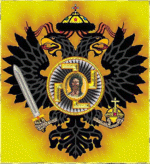|
Pamyat
 The National Patriotic Front "Memory" (NPF "Memory"; Russian: Национально-патриотический фронт «Память»; НПФ «Память», also known as the Pamyat Society; Russian: Общество «Память», Russian: Obshchestvo «Pamyat», Russian pronunciation: [ˈpamʲɪtʲ]) was a Russian far-right antisemitic,[2][3][4][5][6] and monarchist organization. Pamyat also identified itself as the "People's National-Patriotic Orthodox Christian movement." The group's stated focus is preserving Russian culture. Its longtime leader, Dmitri Vasilyev, died in 2003. The group disappeared by the 1990s and was split into groups like Russian National Unity.[7][8] History
At the end of the 1970s, the amateur historical and cultural association Vityaz (Витязь, lit. "Knight") was established by public activists from the Moscow branch of the Society for the Protection of Historical and Cultural Monuments. One of the purposes of the newly formed association was to prepare for the upcoming celebration of the 600th anniversary of the Battle of Kulikovo. Some notable Vityaz activists in Moscow were Ilya Glazunov and V. Kuznetsov (artists), S. Malyshev (historian), A. Lebedev and A. Lobzov (Colonels of the MVD), G. Frygin (Minaviaprom engineer), Vyacheslav and Yevgeny Popov (musicians), and K. Andreyev (locksmith). Similar groups were created in other regions of the Soviet Union. Vityaz and some other informal groups founded Pamyat as a public organization in Moscow in 1980.[9][10] Pamyat took its name from the famous essay novel of the same name by Vladimir Chivilikhin. Paul Klebnikov, in his book The Godfather of the Kremlin, Boris Berezovsky, or the Story of the Plundering of Russia, refers to Oleg Kalugin and writes that "the nationalist group Pamyat… was formed with the help of the KGB." At an internal meeting on October 4, 1985, Pamyat split into several factions, many of which attempted to retain the same name as the "true" Pamyat. One of them, the so-called Vasilyev's group, led by Dmitri Vasilyev (a former worker in Glazunov's studio), A. Andreyev, and A. Gladkov, focused its activities on the media. By the end of 1986, Pamyat's leaders claimed to be the main ideologues of the emerging Russian nationalist movement. On May 6, 1987, Pamyat activists conducted an unregistered and illegal demonstration on Manezhnaya Square in Moscow in support of perestroika and to demand the end to the construction of an officially sanctioned memorial project at Poklonnaya Hill. The event met little repression from the authorities, and the participants met with Boris Yeltsin, then First Secretary of the Moscow City Committee of the CPSU, who listened to them attentively and promised to take into account their wishes. In 1986–1987, other organizations named Pamyat were formed in cities in the RSFSR. The growth of Memory's ranks was accompanied by numerous conflicts between its founders and leaders. In the fall of 1987, the National-Patriotic Front (NPF) was founded with the aim of "renaissance", with the intent to "lead Russian people to the spiritual and national revival" based on "three traditional Russian values": Orthodoxy, national character and spirituality. In 1987–1989, Pamyat was split into several groups, which had in common only a belief in the existence of a worldwide "Zionomasonic conspiracy" and the Pamyat name. By the early 1990s, several organizations bore this name, including:
After several splits and the imminent dissolution of the Soviet Union, the organization adopted a monarchist position. In August 1990, a permanent NPF council member, Aleksandr Barkashov (the author of The ABC of a Russian Nationalist), caused another split after he announced being "tired to be preoccupied by recollections". He said that "it is time to act". His new group was dubbed "Russian National Unity" (Русское Национальное Единство). Barkashov promoted the veneration of the swastika. In addition, in 1990, the following broke away from Dmitry Vasilyev's NPF "Pamyat":[11]
According to writer Valery Shambarov, the plurality of Pamyat organizations was organized by the 5th Directorate (ideological) of the KGB of the USSR with the involvement of the CPSU MGK in order to discredit the organization of Dmitry Vasilyev.[11] In 1991, the organization's newspaper (print run of 100,000) and radio station (both officially registered) were launched. By the late 1990s, the original Pamyat disappeared from the public scene. Dmitry Vasilyev died on July 17, 2003. The organization reactivated in 2005 and participated in the Russian marches. On September 1, 2021, it became known about the death of Nikolai Skorodumov: according to a post by Vladimir Basmanov on the Vkontakte social network, Nikolai Skorodumov died on June 10, 2021, at the age of 70 in a Zelenograd hospital IdeologyThe recurring motive in the group's ideology was the claim of the existence of a so-called "Ziono-Masonic plot" against Russia as "the main source of the misfortunes of Russian people, disintegration of the economy, denationalization of Russian culture, alcoholism, ecological crisis" (according to Pamyat). The Zionists were also blamed for the triggering of the revolutions in 1905 and 1917, the death of millions in the course of the Russian Civil War and for Joseph Stalin's personality cult. The contemporary Soviet government apparatus was alleged to be infiltrated by "Zionists and freemasons" working as "agents of Zionism" and serving the purpose of subordinating the Soviet government to the "Jewish capital". The "Zionist Occupation Government" accusation was often used by Pamyat. In 1993, a District Court in Moscow formally ruled that The Protocols of the Elders of Zion were a fake, and dismissed a libel suit by Pamyat. The organization was criticized for using the document in their publications.[12] The group disappeared by the 1990s and was split into other groups like The National Patriotic Front and The Russian National Unity.[7][8] Quotes
From the open letter of the NPF "Pamyat" leader D. Vasilyev to the President of the Russian Federation Boris Yeltsin:
From the open letter of the NPF "Pamyat" leader D. Vasilyev to the President of the Russian Federation Vladimir Putin:
See alsoReferences
Sources
Further reading
External links
|
|||||||||||||||||||||||||||||||||||||||||||||||||||||



